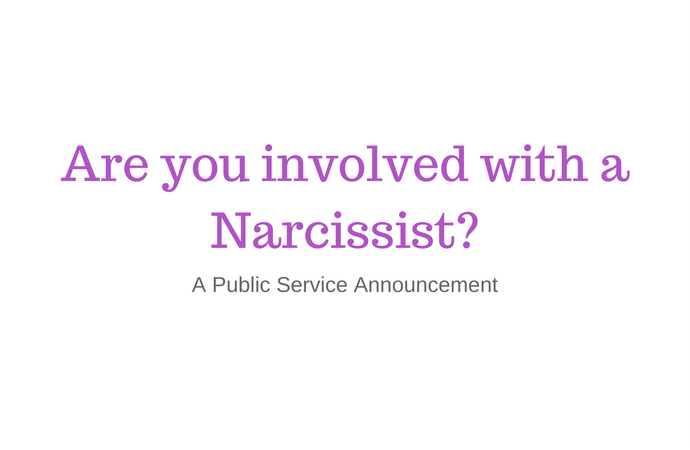Several years ago, I had to declare “No contact” with a friend I cared about, when I realized they were exhibiting many traits associated with Narcissistic Personality Disorder (NPD).
Note: Only psychologists can diagnose NPD, however you can certainly educate yourself around the signs and symptoms, and take decisive action if you feel someone in your life is behaving in a destructive or manipulative way towards you.
If you’re not sure what NPD is all about, then it’s a good idea to do some reading
These articles are good starting points…
Is He or She Really A Narcissist? Laying Boundaries and Accountability
10 Signs That You’re in a Relationship with a Narcissist
Why do you need to know about Narcissistic Personality Disorder?
Narcissists can turn up in our work or personal life, as friends, bosses, work mates or romantic partners.
Not only do they lack self-love, they actively loathe themselves. This is often due to emotional wounds sustained in childhood. As a result, they’re always searching for sources of “narcissistic supply” to validate their sense of Self.
Importantly… Narcissists often target those who are Highly sensitive aka Empaths, as they’re usually intelligent, strong, in touch with their own emotions and those of others. Empaths are also usually people pleasers, have lots of energy and love to give, and tend to put up with a LOT of bad behavior before they wise up.
For Empaths, there’s always a need to keep healthy boundaries in check and ensure you’re not allowing your boundaries to be trespassed simply because you don’t want to upset someone else.
What are the signs something isn’t right?
If a friend or romantic partner is causing you to feel off-centre, drained, confused, disturbed, as if you have no time/space to yourself, or as if something is wrong with YOU (always you or others, never them!), then you may be dealing with someone who exhibits traits on the NPD spectrum.
Prospective romantic partners might attempt to move really quickly in an act that’s known as love-bombing.
They may claim to be your soul mate, and ignore, or walk right over boundaries to get as close to you as they possibly can. Which on the one hand can feel flattering and on the other…very unsettling or draining.
However once they’ve “reeled you in”, a Narcissist may attempt to make you feel crazy, loopy or stupid, via a technique known as gaslighting.
If you’re EVER made to feel this way in any relationship in your personal or business life, that’s a huge red flag!
Is narcissism becoming more common?
I’ve been asked this question and the answer is… I’m not sure. It could be that the more awareness there is around NPD, the more we begin to notice or suspect it in others.
But I also wonder if the increase in people beginning to awaken to their spiritual nature means there are more narcissists coming out of the woodwork as a result. It’s a bit chicken or the egg!
A personal story
While I’ve had Narcissists in my life before, I was quite blindsided in this recent instance because the person in question had excellent camouflage as the “Spiritual & Lovely-But-Wounded” type.
Unfortunately not all narcissists are easy to spot. They can appear to be charming, altruistic, genuine and sensitive. However, their less than wonderful conduct shows up over time, especially if you take action to reinforce your boundaries.
Because I’ve had experience with narcissists, I began to notice things going wonky quite quickly.
One of the key indicators were the attempts to isolate me from my closest friends – both by taking up a LOT of my time and also saying quite negative, critical and untrue things about my friends!
There was also use of triangulation between myself and another friend, a lot of negative criticism and attempts to upset my sense of self.
Because I’ve been going through a lot of full-on spiritual shifts in the last year, this “Spiritual & Lovely-But-Wounded” type attempted to convince me that no one else understood what I was going through the way they did.
Their story was:
No one else in your life has been where you are and where you’re going, but I have. Everyone else is just living in wishful thinking.
Fortunately for me, some of the less attractive narcissistic traits began showing up after a short but intense period of love-bombing.
This person also thought that sharing their displeasure by yelling at me was an acceptable way of communicating!
I had an extra piece of luck when this person’s attentions became focused on someone else! Of course, that was NOT fortunate for the other person, but it certainly helped me to see more clearly what was going on (the idealisation/discard cycle).
There’s a lot of information out there about NPD and signs that you’re involved with a narcissist (see the list of articles below).
In the meanwhile, if you even suspect you might be involved with a narcissist, here’s a few suggestions:
- It can be tricky to admit to yourself that the person you’ve loved and cared about could REALLY be as conniving as they actually are
- I went through that myself – “Surely they ARE NOT a narcissist!” I simply didn’t want to believe it.
- So… forgive yourself! It happens to many sensitive, caring and intelligent people who have yet to learn all the lessons they need to around boundaries and self-love.
- Reach out to friends who are not involved with the narcissist, to gain some perspective. Often a narcissist will cause you to shut down and STOP sharing with others around you out of fear you’ll be seen as crazy or weak.
- Consume as much of Melanie Tonia Evens’ blog as you can and/or read other blog posts on the topic. There are many!
- It can take time to truly eject them from your life. Sometimes – if they’re a co-parent to your child – you can’t completely cut off from them. So it’s important to have strategies to feel good, strong and take care of yourself.
- Forgive the narcissist, too. They’re simply a wounded sensitive person who chose a path of self-hatred that became an external story, requiring validation from others. Their conduct isn’t personal, even though it might feel that way.
- Try setting a boundary with the suspected narcissist, and see what happens – narcissists generally respond negatively to requests for space or boundaries.
- Create space for yourself, which may feel quite difficult as you can end up addicted to the attentions of a narcissist!
Someone who does not exhibit narcissistic traits will not be distressed or insulted by your request for space/boundaries. They might ask why, but they won’t become angry about it.
The only time this will change is if the narcissist suspects you’re becoming aware of their behaviour. Then they’ll move into the “discard/abandon” cycle, and leave you just as quickly as they entered your life!
Healthy relating includes allowing space for others to express their needs and desires, and to be supported in your choices about how you spend your time.
IMPORTANT!
Are you reading this blog post and fearing that perhaps YOU are the narcissist?
I originally wrote this article as a newsletter before I turned it into a blog post. And shortly after sending it, one of my clients rang me asking this exact question.
My response was this: In most cases, the person who worries if they’re a “bad” person or a narcissist is usually not that Thing. Generally speaking, a narcissist may be aware of their narcissism or not. But either way, they aren’t overly concerned and certainly do not agonise over whether or not they are one!
Why might you feel like you exhibit narcissistic traits…
If you’ve grown up with one or both parents, or even a close family member who falls on the NPD spectrum, then as a child you modeled your behaviour and survival traits on what you knew.
So you may have picked up certain ways of interacting, especially when you’re under pressure or feel that your survival is at stake. But that does not make you a narcissist.
If you’re still not sure, talk to a professional who is trained to identify NPD.
Either way, your fears of being a narcissist are pointing out that there are wounds you need to heal. So it’s worth paying attention to that. Go inwards, instead of getting stuck in analysing yourself on a mental level!
Some additional reading that you might find useful
8 Things You Need To Know When Dealing With A Narcissist
So you think you can spot a narcissist? Think again (with video)
Spiritual narcissism works in subtle ways
Recognizing Narcissistic Behavior Traits in Men
6 Signs of Narcissism You May Not Know About
The 7 Stages of Gaslighting in Relationships
Trying to Make the Narcissist Accountable is Keeping You Hooked
5 Sneaky Things Narcissists Do To Take Advantage Of You
How To Help Someone Involved With A Narcissist
I invite you to reach out…
If any of the above sounds like you, I’m more than happy to chat with you.
Sometimes extracting yourself from the narcissist’s world takes a lot of time, effort and support. And a swift up-skilling of your boundaries and willpower!
We can discuss an action plan, and ways to find support that will keep you from falling backwards into the world of the narcissist once more.
Much love,

 |
Ambha Amanda Roberts is a Kinesiologist, Intuitive Healer, educator and facilitator based on the Sunshine Coast, Australia. She offers Kinesiology sessions both in-person and via Skype/Zoom all over the world. Ambha Amanda is the co-creator of Adventures of Staria, which includes a series of Staria cards, and an upcoming book for children (including inner children). |


